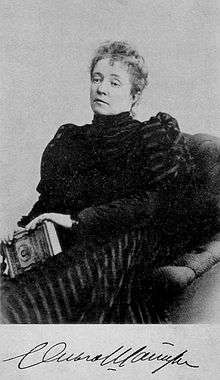Olga Shapir
Olga Andreyevna Shapir (Russian: Ольга Андреевна Шапир; October 9, 1850 – July 13, 1916) was a Russian writer and feminist.
Olga Shapir | |
|---|---|
 | |
| Born | October 9, 1850 Oranienbaum |
| Died | July 13, 1916 (aged 65) Saratov Governorate |
Biography
Shapir was born in Oranienbaum (now Lomonosov, Russia) in 1850. She was one of nine children. Her father, a peasant, served as an army clerk, for a while under the Decembrist leader Pavel Pestel. Her mother was of Swedish descent.[1][2]
She married Lazar Shapir in 1872.[2] The couple had connections with several prominent revolutionaries. They lived for a time in a commune in Saint Petersburg, where they were associated with the Kornilova circle, one of whose members was Sofia Perovskaya. They were also on the fringes of a group ran by Sergey Nechayev. Lazar spent eight months in the Peter and Paul Fortress for radical activities before his marriage to Olga.[1]
Her first work of fiction was published in 1879.[2] In her fiction she defended the Russian revolutionary movement against its critics. She wrote her novel The Stormy Years to counteract what she saw as the distortions of Fyodor Dostoyevsky (in The Possessed) and others. After this her works were published in many of the most popular journals of the time, including Otechestvennye Zapiski, Severny Vestnik and Vestnik Evropy.[2][3] Her ten-volume collected works were published in 1910.[1]
Her primary public activity was in feminist organizations.[3] She joined the Russian Women's Philanthropic Society in the 1890s, and was a member of the committee of the 1908 Women's Congress.[1][2]
English translations
- The Settlement, from An Anthology of Russian Women's Writing, 1777-1992, Oxford University Press, 1994.
References
- Ruthchild, Rochelle Goldberg (2010). Equality & Revolution: Women's Rights in the Russian Empire, 1905-1917. University of Pittsburgh Press. pp. 13–14. ISBN 0822960664. Retrieved June 17, 2012.
- Kelly, Catriona (1994). An Anthology of Russian Women's Writing, 1777-1992. Oxford University Press. p. 118. ISBN 0198715056.
- Cristensen, Hilda (ed) (2004). Crossing Borders: Re-Mapping Women's Movements at the Turn of the 21st Century. University Press of Southern Denmark. pp. 146–147. ISBN 8778388597.CS1 maint: extra text: authors list (link)